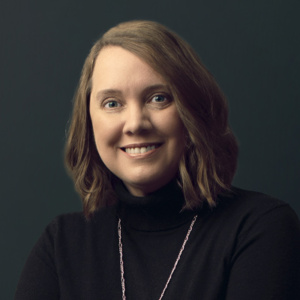Many fonts and the way they are displayed can be difficult for users to read. Creating a website that is accessible allows all visitors to navigate sites easily and...
April 22, 2024
Key Takeaways: 2021 LMA Southwest Regional Conference
“Adapt, grow, and emerge – a new A.G.E. in legal marketing”—this was the theme of the 2021 LMA Southwest Regional Conference, an insight-packed, interactive virtual event that took place from May 19 to May 21.
The conference tackled the question, “How will we adapt, grow, and emerge in a positive way to address the monumental changes our society and industry are facing?”
It has certainly been a strange, often difficult period for our industry and profession. With a post-pandemic future on the horizon, this conference was an excellent opportunity to
- ADAPT: Adjust to new conditions
- GROW: Develop or mature physically, mentally, or spiritually
- EMERGE: Recover from a difficult or demanding situation
The conference was also a welcome chance to reconnect with our legal marketing colleagues and share tips and war stories. The strength of the legal marketing community shone through every session and event, illuminating a bright future.
This article covers just a few of the highlights from the conference. If you would like more information about any of these sessions or wish to connect with any of the speakers, you might try reaching out to them on LinkedIn.Conference Sessions:
- Day 1: Sessions Summary
- Spotlight Session: Strategic Practice Group Planning
- Session: Master Your Morning Routine
- Day 2: Sessions Summary
- Workshop Session: Digital Marketing in a Nutshell
- Session: Adapting to an Evolving Business Development Landscape Through Virtual Engagement
Day 1 of LMASW Conference Sessions
Keynote Address: Greatness Grows Best in the Shadows
The 2021 LMASW Regional Conference kicked off with a keynote address from Justin Forsett, former NFL running back turned entrepreneur. After a nine-year career playing with seven different NFL teams, Forsett set his eyes on entrepreneurship. He founded and is CEO of Hustle Clean, a mission-driven, black-owned business.
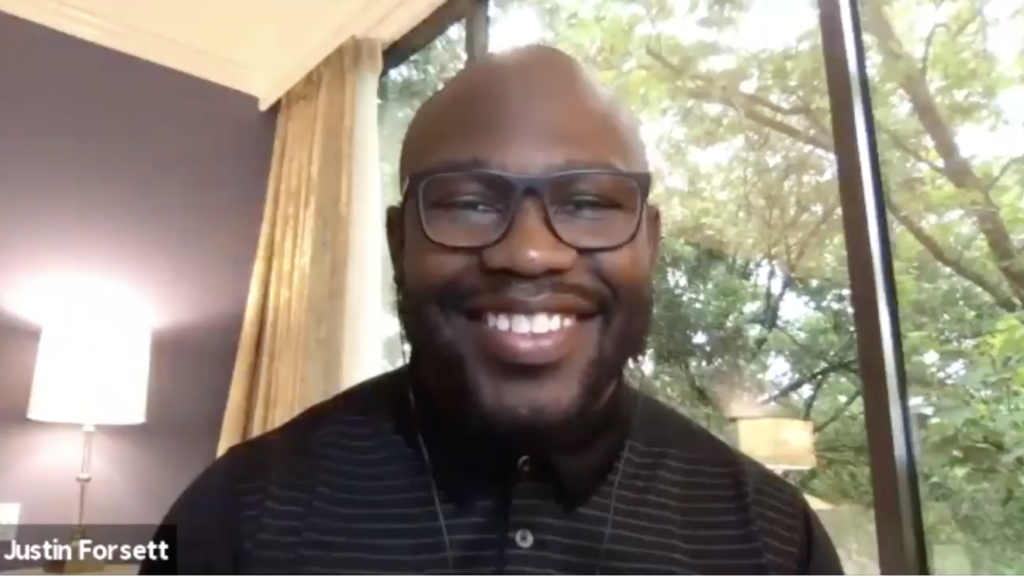
In his talk “Greatness Grows Best in the Shadows”, Forsett shared insights on what legal marketers can do to prepare for a breakthrough. Drawing on his career as an “undersized and overmatched” running back, Forsett discussed what marketing professionals can do to not only survive in periods of uncertainty but thrive. Focusing on the controllable, building a huddle of people you can depend on, and committing to serving are principles that can help marketers to prepare their law firms for the road ahead.
Day 1: Sessions Summary
The first full day of the conference was packed with sessions lead by leading experts in legal marketing.
These past 14-months have been challenging and law firms have had to adapt their marketing and business development strategies to navigate unusual terrain. This period of forced experimentation has offered some silver linings—many firms have become more open to new ideas. All the speakers at LMA Southwest were quick to point out that these recently acquired adaptations offer benefits for the months and years to come.
In the session “Public Relations Role as a Revenue Generator Post 2020”, Terry Isner, Owner & CEO of Jaffe, raised the question of why business development programs and public relations plans are often treated separately. Isner observed that to adapt to new market realities, law firms must integrate public relations and business development into one multi-faceted approach.
Bridgett McGowen, an award-winning professional speaker and owner of BMcTalks, LLC, shared secrets on crafting standout, stellar presentations that make audiences sit up and take notice. She shared welcome antidotes for webinar fatigue and tips for creating presentations that are “all sizzle…no fizzle”.
Legal marketers are sometimes expected to have all the answers even when something is not in their area of expertise. But it is nearly impossible to know everything, especially about technical, specialized subjects like website design, digital accessibility, and SEO. Lynn Foley, CEO, and Rob Foley, Chief Digital Officer, of fSquared Marketing answered questions from attendees, providing some much-needed clarity and more than a few takeaways about how law firms can stand out online. If you didn’t have a chance to catch this session or have your question answered, you can still email Lynn Foley at lynnfoley@fsquaredmarketing.com or connect with her on LinkedIn.
Effective legal marketing requires both breadth and depth. A breadth-based strategy expands the marketing funnel, increases brand awareness with target audiences, brings more visitors to a firm’s website, and builds an audience for a firm’s thought leadership. In his Session, Adam Severson, Chief Marketing and Business Development Officer of Baker Donelson, focused on a depth-based strategy: how legal marketers can dig into high priority client relationships to create more meaningful, fulfilling, and profitable connections with existing clients. Ultimately, Severson noted, the goal is to become a client’s “trusted advisor”.
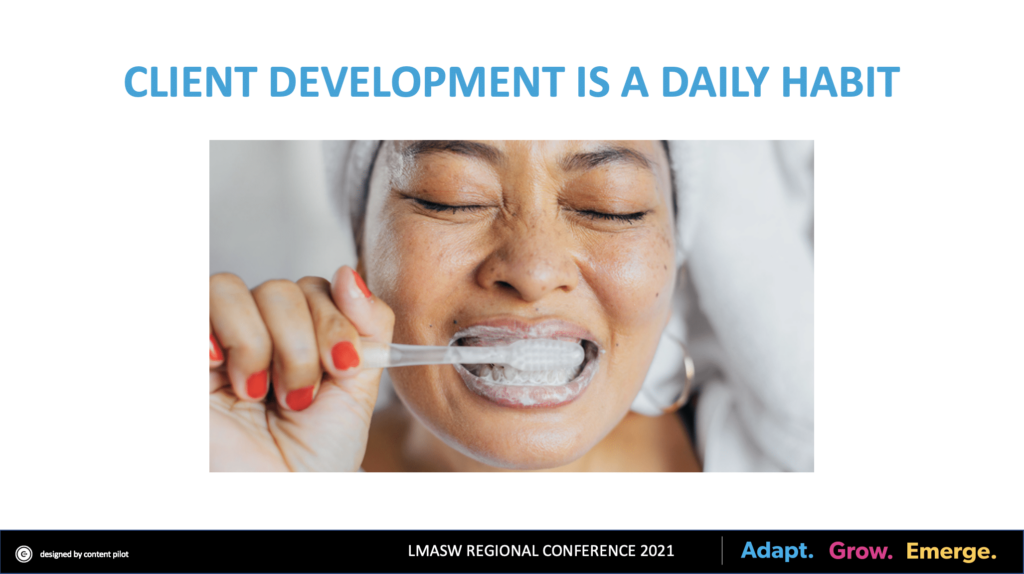
In “The Power of Podcasting”, Jennifer Simpson Carr, Director of Business Development at Furia Rubel Communications, Inc., Laura Briggs, a PR and marketing consultant, and Mary Pendarvis, senior brand and creative services manager at McGlinchey Stafford, provided tips on building a business case for this hot new medium. How should a law firm get started? The first step is to determine how podcasting can align with your firm’s current marketing strategy. Next, you would need to determine the costs (both of equipment and time), the format, content, and topics, the marketing, and which metrics to track.
Spotlight Session: Strategic Practice Group Planning
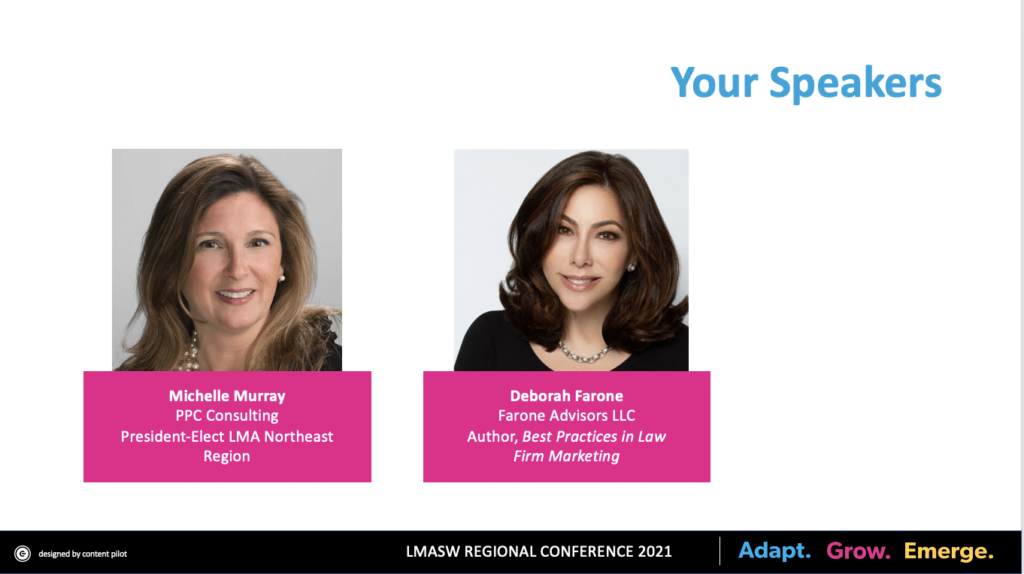
Legal marketers can market the firm, specific practice areas, or even individual lawyers. In the Spotlight Panel, “A New A.G.E. in Legal Marketing: Strategic Practice Group Planning”, Deborah Farone, strategic marketing and management advisor at Farone Advisors LLC, and Michelle Murray, senior consultant at PP&C Consulting and president-elect of LMA Northeast Region, shared best practices for practice group development considering the new dynamics as we move into a post-pandemic period. They outlined an approach involving setting objectives, SWOT analysis, strategy development, tactical implementation, and measurement and reporting while maintaining communication with key players against a clear timeline.
Farone and Murray stressed the importance of doing the pre-work and laying a foundation for success based on competitive intelligence research and a detailed understanding of the market, the competitors, and the growth opportunities. Specificity in planning is essential to effective execution. Farone noted that, while many lawyers are interested in having more clients in a hot industry, that goal is often too broad to be actionable. ‘We want to have more banking clients,’ is a starting point, not a fully defined goal. “One of the ways I get people to talk is to ask them a lot of questions about their objectives,” said Farone, “and keep on asking questions until you can narrow it down.”
Murray observed that successful practice group development requires a deep understanding of the challenges that clients are facing, or even better, that they will face in the next few months. She suggested using Google Alerts to keep tabs on clients and using alerts within Bloomberg Law and other legal intelligence services to stay abreast of industry and regulatory developments. “You want to understand what is going on upstream and downstream for your clients,” she said.
Marketers should set the stage by conducting a SWOT analysis of the practice area. SWOT stands for Strengths, Weaknesses, Opportunities, and Threats. To succeed, consider each quadrant in detail. Murray observed that the strengths and weaknesses section “lays a foundation and provides a context of what is happening within the firm…while the opportunities and threats explore what is going on externally.”
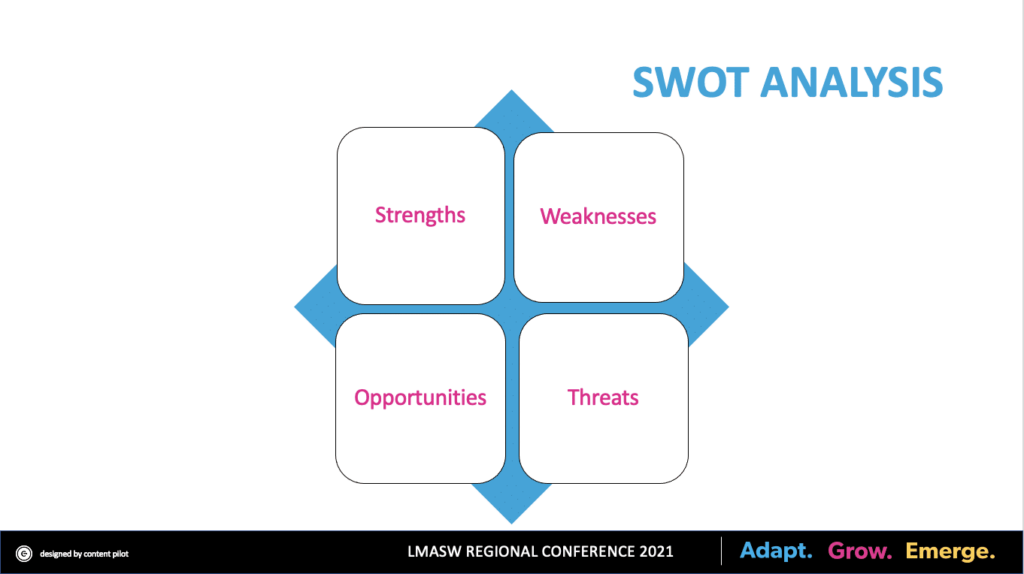
With the SWOT analysis complete, legal marketers can begin formulating tactics “the bread and butter” of a successful campaign. They will also need to determine how they will measure their progress. What metrics should be tracked and how will success be measured?
Farone suggested starting small. “Let’s say our goal is getting meetings, for example. We want to know if we can get five meetings in a month.” Small goals are easier to measure and can be built on. Goals that are too large are harder to measure progress against and can be overwhelming. Farone also mentioned that “You don’t want to track absolutely everything.” She suggested using the SMART criteria for setting objectives: goals should be Specific, Measurable, Achievable, Realistic, and Timely.
When it comes to selecting the appropriate medium and message for marketing activities, Farone suggested asking clients where they get their news and in what form they prefer to receive marketing content. “You want to be where your clients are, that’s the main thing,” she said. The best marketing doesn’t feel like marketing; instead, it feels like a solution to the problems your clients are facing.
Farone also pointed out that practice area promotion needs to be honest. Not every lawyer is right for every client. “You can’t sell yourself as being great in everything,” she said, observing that this comes off across as disingenuous. When a lawyer or practice group team is faced with a matter outside of their expertise Farone suggested helping the client connect with the lawyer who is best for this area. This can help your firm to be seen as a true partner and build trust with the client.
If strategy is going to be more than just planning on paper, tactical execution is required—this is where theory meets reality. Murray and Farone shared 6 tips to ensure the successful execution of a business plan:
- Engagement
- Socialization
- Planning process
- Groups that work
- Metrics/tracking/reporting out
- Celebration of success
Engagement is of critical importance. Legal marketers frequently run into the obstacle of lawyers who don’t have time or the inclination to execute on their part of a plan. Farone and Murray suggested several methods for dealing with this all-too-common scenario. Farone said that lawyers should be part of the planning process from the start so that they feel ownership and know what will be required of them; “Don’t give them the plan, involve them in the creation of the plan.” These plans should be as simple as possible and be “live” documents that can be updated.
Farone also noted that big committees can impede action, although Murray noted that decision-makers often need to be involved. Murray suggested having a strategy to engage partners who might be “a bump in the road”.
Farone again suggested starting small: “Why not start with the smallest actionable body, the individual lawyer?” She noted that there is an immense benefit in having “smaller plans for smaller practices” and using “mini-marketing plans” to execute efficiently.
One attendee shared what is a frustrating experience for legal marketers, being “ghosted” by the very lawyers who they are trying to help with a marketing plan. Murray offered several suggestions, including “working with the willing”, and letting lawyers know that, as marketers, we have limited resources and if a lawyer is too busy, we will go work with another lawyer instead.
Farone observed that if a lawyer is not responsive, they may be afraid of failure, confused about the process, or simply overwhelmed with casework. She suggested asking questions to get to the source of the delay and, if necessary, asking the lawyer if there is someone else who can act on that part of the plan.
Day 2 of LMASW Conference Sessions
Session: Master Your Morning Routine
Day 2 of the LMA Southwest conference began with “Master Your Morning Routine: A Workshop to Help Prevent Burnout, Supercharge Productivity, and Boost Mental Health”, led by Casey Renee Rogers, wellness & accountability coach at Health on the Rocks.

It has been, Renee Rogers noted, “a tough year”. Legal marketers deal with high levels of stress, and COVID-19 has only ratcheted up the pressure; in a survey of more than 400 legal marketers about stress and mental wellness, conducted by fSquared Marketing in partnership with LMA, nearly 80% of respondents said that their work-related stress had increased during the pandemic.
Renee Rogers outlined physical and psychological warning signs of impending burnout. She also helpfully called attention to some common misconceptions about how to deal with stress.
We overestimate our ability to self-motivate and underestimate the power of habit to shape our days and lives. Establishing a robust morning routine allows us to tackle challenges when our motivation is at its highest level, prioritize for the day ahead, and engage in “habit-stacking”, the grouping of small activities into a virtuous routine.
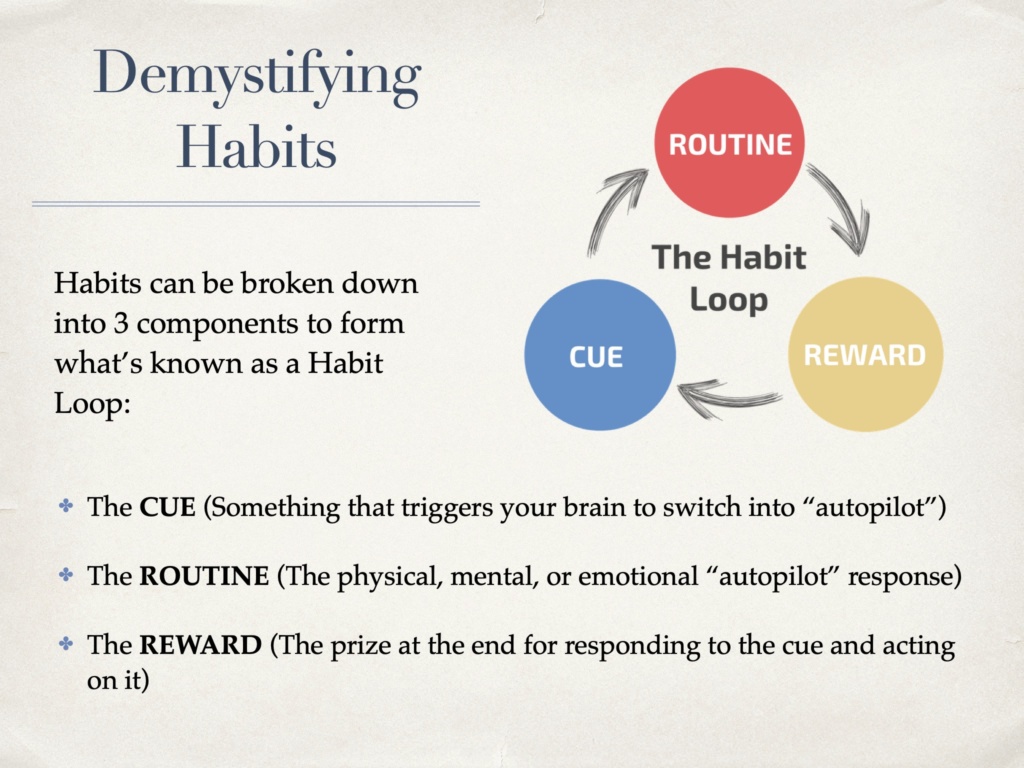
Here are the 5 steps Renee Rogers suggests for establishing a 30-minute morning routine:
- Cheers the Day: Drink a glass of water + a ritual beverage (e.g., coffee, tea).
- Focus the mind: 5 minutes of mediation or journaling.
- Activate the body: 5 minutes stretching or walking.
- Brain dump: Create a master list of tasks to be completed.
- Prioritize the day: Look back at the list from #4 and rank each task from 1-3 in terms of priority.
Even if you cannot commit to all these steps, picking one or two to start will still bring you benefits and, hopefully, balance.
Day 2: Sessions Summary
The second day of the LMA Southwest’s 2021 conference was just as insight-packed as the first.
Legal marketers wear many hats. Strategist, content creator, coach, and cheerleader…the list goes on. Often enough, legal marketers are required to take on a project manager role, shepherding projects large and small through the approval, assembly, execution, and launch cycle. Jordan Fowler, director of business development at Beck Redden LLP, and Katie Flores, president of Armitage Consulting, outlined the skills and strategies necessary for effective project management. Communication is paramount, particularly documentation (design guidelines, training manuals, editorial calendars, etc.) outlining duties and providing a point of reference for all involved parties. There are two approaches to starting a project: targeting small, quick wins to build momentum or taking on the part that will have the biggest impact. While a foundation and a framework can help a project go smoothly, at some point you just need to start.
In the session “Knowledge Extraction Role-Playing: How to Get the Information You Need From Even the Most Difficult Attorneys”, Michelle Calcote King, principal and president of Reputation Ink, laid out strategies for addressing one of the biggest challenges to effective thought leadership: the knowledge gap between lawyers and legal marketers when it comes to the law and legal developments. Calcote King shared professional interviewing techniques that legal marketers can use to obtain information from even “the most tight-lipped, difficult to interview attorneys.” She suggested that legal marketers should self-educate on basic concepts, conduct research before an interview, ask leading questions, and not be afraid to ask the lawyer for further explanation. Remember, if you, as a legal marketer, are having a hard time understanding a topic, chances are your target audience will also struggle. By working together, marketers and lawyers can create content that is useful and understandable.
Workshop Session: Digital Marketing in a Nutshell
Jessica Aries, CEO of By Aries, invited attendees on a whirlwind, information-packed tour of digital marketing for law firms. Aires stressed that digital marketing is not something that legal marketers can afford to ignore. As she pointed out, the dichotomy between “traditional” and “digital” marketing is largely illusory. In the Information Age, all marketing has a digital component.
Law firms face increasing competition from legal tech providers and alternative legal service providers. “Our competition is not other law firms. Our competition is tech companies,” said Aires. “Our competitors are legal technology companies that have already mastered digital marketing.” Although this is a slight overstatement, Aires’s point is clear. Law firms cannot afford to be complacent or expect the legal market to go unchanged. And they certainly cannot afford to cede the digital ground.
Legal tech companies are offering increasingly sophisticated software solutions that might disrupt the flow of work to corporate law firms. For example, 50% of in-house legal departments will have automated their legal work related to major corporate transactions by 2025, according to Gartner’s 5 Legal Technology Trends Changing In-House Legal Departments. In their report, Gartner also predicts that in-house legal departments will more than triple their spending on legal technology by 2025.
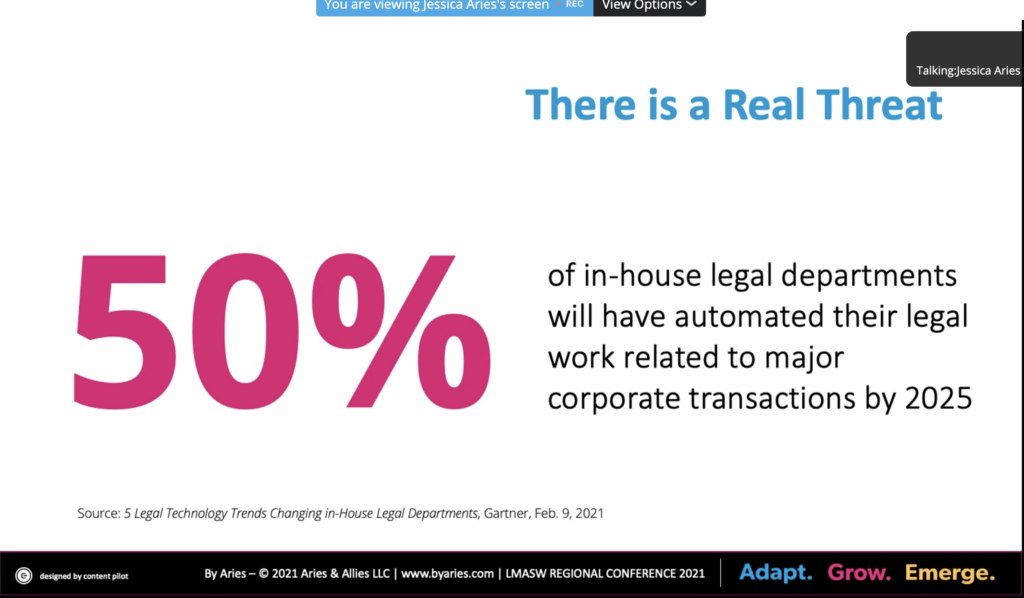
The Big Four (Deloitte, Ernst & Young, KPMG and PwC) have also continued to use their existing relationships and technological advantages to gain market share. These challengers are well-versed in digital marketing, an arena where many law firms are reluctant to engage fully.
So where to start? Digital marketing can be complex, and it is full of specializations and confusing acronyms, what Aires referred to as the “digital marketing alphabet soup”. But you don’t need to know everything to obtain wins for your firm.
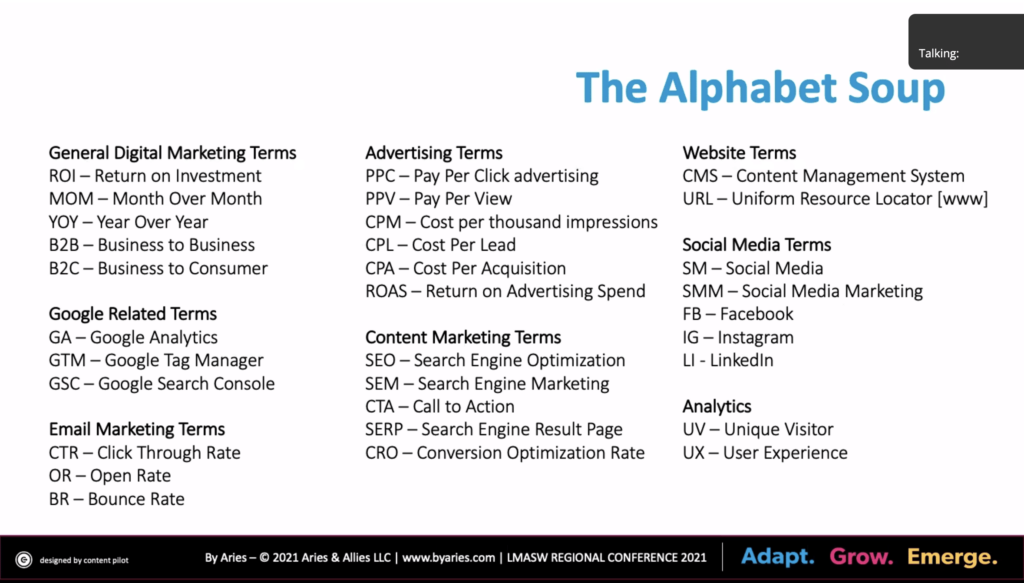
Steps for creating a digital campaign include defining your target audiences in detail and determining the right content, actions, and tools needed to reach audiences at every level of awareness: from just learning about a legal problem to considering options to loyal clients who can become an important source of referrals. The role of the marketer remains as Steve Jobs said, to “master the topic, the message, and the delivery.” Digital marketing doesn’t change that core definition, but it does add more tools, targeting options, and metrics to the mix.
Aires used the familiar marketing funnel model to guide attendees through the exercise of creating campaigns that are effective in moving prospective clients from the awareness phase through to the evaluation phase. You can use different metrics during each stage of a campaign to measure performance, but not everything that can be tracked should be tracked. Pay attention to the metrics that align with your strategic goals and use benchmarks, when possible, to set performance goals. Also be aware of the context: digital marketing for law firms during COVID-19 has required its own considerations.
Other tips for a successful digital marketing campaign include repurposing your best content in different formats across different platforms and being selective about what digital/social media platforms you choose to be active on. Some platforms, such as Instagram stories, work best when they are lawyer-driven. As a marketer, you don’t want to get into managing individual lawyer social media accounts as this is a tremendous time-sink.
Session: Adapting to an Evolving Business Development Landscape Through Virtual Engagement
While we are emerging from the pandemic that had many of us working from home for the past 14-months, there are signs that Zoom calls and virtual (or hybrid) conferences are here to stay.
In the final session, Amanda Schneider, CMO at Epstein Becker Green, Christine Clapp, president of Spoken with Authority, and Jonathan Fitzgarrald, managing partner of Equinox Strategy Partners, posed the question: “What will the future of business development interaction look like in a hybrid environment?”
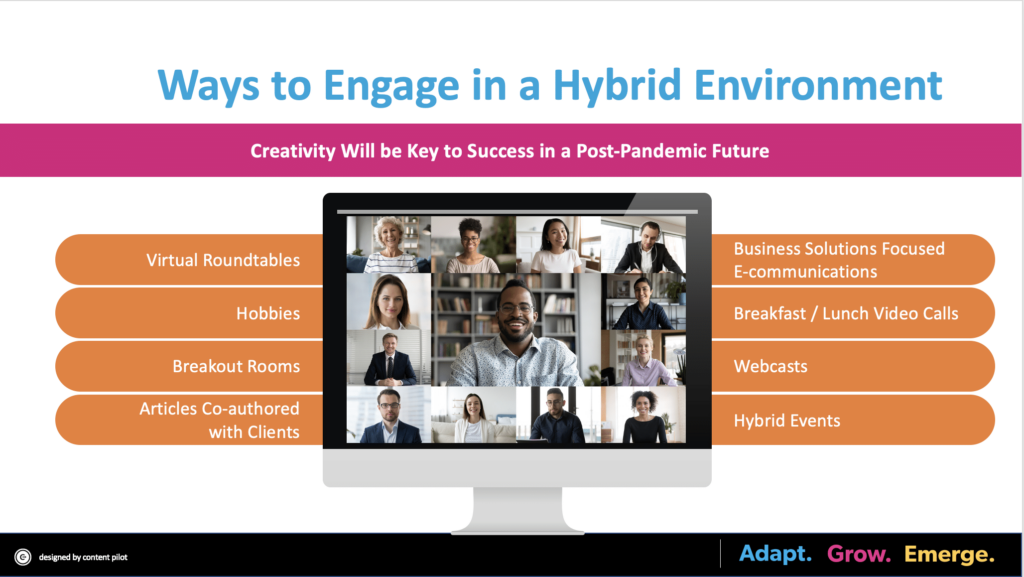
Despite the oft-mentioned “webinar fatigue”, 65% of respondents to a study conducted by Pew Research Center felt that “virtual tools are a good substitute for in-person contact”. 63% also reporting being fine with using video conferencing regularly. Given the likely permanence of virtual events and presentations in our lives, legal marketers need to become proficient at delivering exceptional virtual experiences and building trust through online activities.
Fitzgarrald noted, “There’s an incorrect perception that you have to be in-person to build trust.”
Elements of building trust include:
- Competency
- Fairness
- Openness and vulnerability
- Congruency and authenticity
- Transparency
- Reliability and dependability
Virtual or not, storytelling is at the heart of compelling marketing. The presenters shared a few structures for creating engaging stories including Monroe’s Motivated Sequence which starts with defining the Need (Problem), offering Satisfaction (a Solution), and then Visualization (Benefits).
As Clapp pointed out, prospective clients don’t necessarily care who your law firm is and what you do (at least not initially). “They care about whether your firm can help them to solve a problem.”
A Successful LMA Southwest Conference Delivered in Extraordinary Circumstances
The LMA Southwest Conference offered attendees a wealth of insights and a welcome chance to adapt, grow, and emerge. Although it was held virtually, attendees left with concrete insights and actionable takeaways.
This event would not have been possible without the hard work of Conference Co-Chairs Vanessa Petrea, LMASW president elect, and Stacey Hall, LMASW Director-at-Large (Advocacy), all the LMA Southwest Regional Conference Committee Members, and the generous support of all the conference sponsors.
fSquared Marketing is honoured to be a Gold Sponsor of the LMA Southwest Region and to have sponsored this excellent conference. We look forward to connecting with you again at the next event.
Sign Up To Our Newsletter
